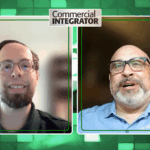Even the most successful companies in the world go through some sort of adversity along the way. The key differentiator between the companies that make it through to the other side is how they respond when trouble bubbles up.
On the opening night of the 2014 Business and Leadership Conference in Dallas, NSCA handed out its annual Excellence in Business Awards to five companies that serve as the benchmark in fiscal responsibility, growth strategies, recurring revenues, professional development and marketing strategies.
Rob Simopoulos, president of Advance Technology of Scarborough, Maine, took home the EIB award for marketing strategies, but that doesn’t mean the company hasn’t sometimes undersold what it can bring to its clients.
After visiting a client with a high-tech, user-friendly surveillance system, realizing the client is thrilled with the system but then noticing that five of the six high-definition cameras weren’t working, “we realized that by selling a client a service contract, we’d actually be better serving them,” says Simopoulos.
By being able to remotely solve a client’s problem without rolling a truck, the integrator “puts itself in a completely different competitive situation … and it’s cheaper for the customers … so there is a sales angle to it,” he says.
Related: More 2014 NSCA BLC Coverage
Mike Brandofino, executive VP of video and unified communications for AVI-SPL, has seen the company’s service department build relationships with clients to the point that when that client needs another project they “don’t even go to RFP [request for proposal] because we’re so embedded.” So it leads to additional work, which is why the company was honored for growth strategies.
But asking some sales staffers to think beyond selling projects was not without its issues, he says.
“You can’t expect every salesperson to get on board,” says Brandofino. “We had to provide the resources to help them identify the opportunity.”
Jim Ford, co-founder of Ford AV, says being fiscally responsible isn’t easy and “it’s not something you just do; it’s culture.” One thing this industry “should never do is under value what we do. I think we sell our systems and work [for] way too low margin. I think furniture stores make more than we do.”
“It’s not unusual for us to bid 20 jobs and not get one. That should show you we’re not low cost,” says Ford. “We have a formula and we do it the same way all the time. If we win a job, we’re happy with the margin, we’re happy with the profit and we can do the job and have a happy customer. The key is to bid on a whole lot of work, send out a lot of proposals, hopefully you’ll win your fair share.”
Human Circuit launched a unique around-the-clock monitoring offering a few years ago that includes a hidden diagnostics approach that “started as self-preservation but became a differentiator for us,” according to president and CEO Bruce Kaufmann in an earlier interview.
Marketing director Pamela Zacha says she wishes the company had done a better job of preparing its customers for what was coming in terms of converging technologies.
In terms of professional development, Technical Innovation of Atlanta has tried to always stay in front of the pack.
“You have to accelerate everything and be more aggressive at driving professional development,” says CEO Mike Landrum. “You have to figure out way to help everyone understand how important it is. You have to hire, attract and set expectations for all employees.”
At Technical Innovation, that means tying professional development directly to performance reviews and requiring them to update their own Share Point profiles, says Landrum.
Related: More 2014 NSCA BLC Coverage














